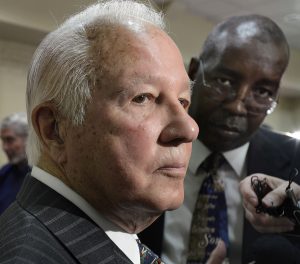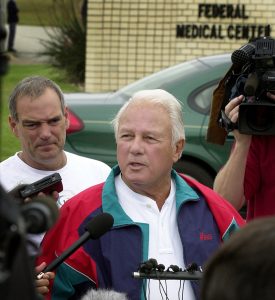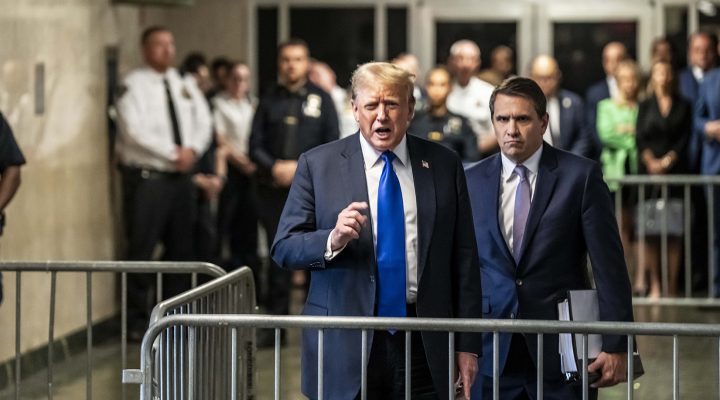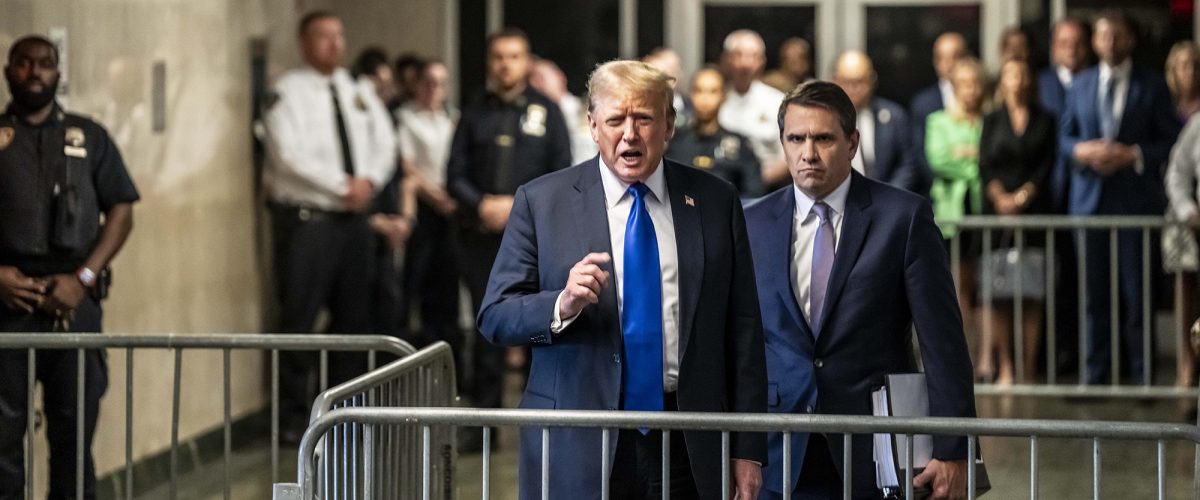As I watched the announcement of Donald Trump’s conviction on 34 felony counts May 30, I thought to myself, “I’ve seen this show before.”
Indeed, I was living in Louisiana in 2001 when Gov. Edwin Edwards was convicted of racketeering and sent to federal prison. The parallels between Trump and Edwards are remarkably strong.

Rodney Kennedy
Louisiana may lead the nation in elected officials doing time for crimes. Since 1980, 71 Louisiana politicians have been convicted of an array of crimes. Even when our colorful politicians didn’t go to jail, we have been tainted by scandal.
Many Louisiana residents have long reveled in our state’s reputation for crooked politicians. The sheriff of Avoyelles Parish was re-elected to his job while serving time in his own jail for malfeasance in office.
A movie was made of “Uncle Earl” Long’s sexual liaisons with New Orleans stripper Blaze Starr. Ted Jones, an 81-year-old former aide to Long, said after Starr’s death, “Of course, Ms. Blanche (Long’s wife) didn’t like her, but that was beside the point. … It didn’t mar his legacy; it demonstrated that old men have a flair for nice women.”
Democratic U.S. Rep. William Jefferson’s Congressional office was raided on Aug. 3, 2005. During a later raid of his home, FBI agents found $90,000 of cash in a freezer, wrapped in aluminum foil and stuffed inside frozen-food containers. Jefferson gave literal meaning to the idea of “cold, hard cash.”
Edwin “Fast Eddy” Edwards was raised a Roman Catholic and preached in the Church of the Nazarene as a teen. He didn’t drink or smoke. Despite his unabashed fondness for high-stakes gambling, dirty jokes and his reputation as a womanizer, he earned a following among Catholics and fundamentalists.
After one of his winning races for governor, Edwards paid off his debts from the $14 million campaign by chartering a $10,000-a-head trip to France for his friends and supporters. “I’ve wanted all my life to be a king, and now I can be,” he quipped during their stop in Versailles.
The New York Times said of Edwards: “He served four terms, charmed voters with his escapades and survived a score of investigations before going to prison in 2002 for racketeering.”
“Before there was Donald Trump, there was Edwin Edwards.”
Before there was Donald Trump, there was Edwin Edwards.
Louisiana loved Edwards — charismatic, intelligent, humorous, political genius, easy to relate to and with a sense of being the common man. Edwards may have been the greatest political quipster since Winston Churchill: “As you know, they sent me to prison for life,” he told them. “But I came back with a wife.” When questioned about illegal campaign contributions, Edward replied, “It was illegal for them to give, but not for me to receive.’
For decades, Edwards was the target of criminal investigations that went nowhere. He acknowledged being questioned by 22 state and federal grand juries — about selling state jobs to campaign contributors, about a $10,000 “gift” to his wife from a Korean businessman and about paying gambling debts with cash of unknown origin. “Fast Eddie,” shrugged it all off.
Early in 1982, Edwards said he was so committed to running again for governor that “only death alone can separate me from this.” And indeed he won again.
Before election day, Edwards joked with reporters: “The only way I can lose this election is if I’m caught in bed with either a dead girl or a live boy.” Edwards zinged his opponent many times, once describing him as “so slow it takes him an hour and a half to watch 60 Minutes.” During a gubernatorial debate in 1983, his opponent asked Edwards, “How come you talk out of both sides of your mouth?” Edwards instantly responded, “So people like you with only half a brain can understand me.”

On March 17, 2014, former Louisiana Gov. Edwin Edwards speaks to reporters at the Baton Rouge Press Club in Baton Rouge, La. (AP Photo/Travis Spradling)
In February 1985, soon after his third term began, Edwards was forced to stand trial on charges of mail fraud, obstruction of justice and bribery, brought by U.S. Attorney John Volz. The charges were centered on an alleged scheme in which Edwards and his associates received almost $2 million in exchange for granting preferential treatment to companies dealing with state hospitals. Edwards proclaimed his innocence and insisted the charges were politically motivated by his opponents.
The first trial resulted in a mistrial in December 1985, and a second trial in 1986 resulted in an acquittal. After Edwards and his four co-defendants were acquitted, the hotel where the jurors had been sequestered revealed that half the jurors had stolen towels as they left. Edwards quipped that he had been judged by a “jury of my peers.”
The trials were a circus, and at one point during the first trial but before the mistrial, Edwards rode to the Hale Boggs U.S. Courthouse on a mule from his hotel. When asked by reporters why he did so, he replied something to the effect that it was symbolic of the speed and intellect of the federal judicial system, but also that he supported “tradition.”
Marion Edwards, his attorney, often wore a pinstripe suit with a top hat and cane and held comedic press briefings at the end of each court session on the steps of the courthouse. Marion Edwards mocked the U.S. Department of Justice, U.S. Attorney John Volz and federal judge Marcel Livaudais, who presided over the trials.
“For my money, Edwards was smarter, slicker, savvier and funnier than Trump.”
For my money, Edwards was smarter, slicker, savvier and funnier than Trump, but Edwards and Louisiana taught Trump and MAGA how to dance with the devil.
Edwards was elected governor of Louisiana for a fourth time when he defeated David Duke, a former grand wizard of the Ku Klux Klan. A popular bumper sticker urging support for Edwards read, “Vote for the Crook. It’s Important.”
Edwards said of Duke that “the only thing we have in common is that we both have been wizards beneath the sheets” and feigned concern for Duke’s health due to smoke inhalation “because he’s around so many burning crosses.”
When a reporter asked Edwards what he needed to do to triumph over Duke, Edwards replied, “stay alive.” On election day, Edwards defeated Duke in a landslide, 61% to 39%, a margin of nearly 400,000 votes.
After his fourth term, Edwards was indicted in 1998 by the federal government with the prosecution led by U.S. Attorney Eddie Jordan. Edwards, the high roller of Las Vegas, finally was convicted on charges of taking bribes from gambling interests for licenses for riverboat casinos.
Edwards was found guilty on 17 of 26 counts, including racketeering, extortion, money laundering, mail fraud and wire fraud. Edwards seemed unfazed: “I did not do anything wrong as a governor, even if you accept the verdict as it is, it doesn’t indicate that.”

Former Louisiana Gov. Edwin Edwards talks with reporters Monday, Oct. 21, 2002, outside the Federal Medical Center in Fort Worth, Texas, before checking into the prison to serve a 10-year sentence. (AP Photo/The (Shreveport) Times, Jessica Leigh)
On his way to prison he said, “I will be a model prisoner, as I have been a model citizen.” Gov. Edwards became inmate No. 03128-095.
In a poll taken in October 2011, months after he had been released from prison, 30% of respondents named Edwards the state’s best governor since 1980. Bad boy, gambler, womanizer, convicted felon, Edwards still was the king of Louisiana.
Donald Trump may face the same fate. Although time will tell. He said while leaving the courthouse the real verdict will be delivered by the American people Nov. 5 — in an election he may not be able to vote in as a convicted felon. But in an irony that would make Louisiana proud, convicted felons are not barred from serving as president.
For now, we are witnesses to history. Trump is the first president ever put on trial for criminal charges. No matter how much of a circus the trial has been, it is an unprecedented event in American history.
Will any of this matter to the voters? Even his supporters have long known Trump was a convicted liar, yet they supported him. They knew he was guilty of defrauding students in the Trump University case. No problem. They supported him. They knew he defrauded vendors and business partners, but no worry, that’s just business. They knew he survived two impeachment trials only because he had a Republican majority in the Senate, but that’s just politics.
No populist ever has attracted Trump’s level of support in the United States. He could have used that for good, but he has chosen a different path. A path fueled by his arrogance, greed and disdain for the rule of law.
Will he go to prison? Will he be elected president again? It’s too early to tell. Things that would instantly destroy any other politician only make him more popular with his base. Like a good politician from Louisiana, don’t count him out.
Having cast my vote for Edwards, the crook, in 1991, I realize many Americans may make the same decision even after Trump has become a convicted felon.
Rodney W. Kennedy is a pastor and writer who serves in New York state and Louisiana. He is the author of 10 books, including his latest, Good and Evil in the Garden of Democracy.
Related articles:
More Latino voters are up for grabs in consequential states this year
Trump is leading: What does this say about us? | Opinion by David Gushee
One thing that must happen in 2024 | Opinion by Mark Wingfield
Letter to the Editor: We vote for the party, not the person | Opinion by Burton Patterson


